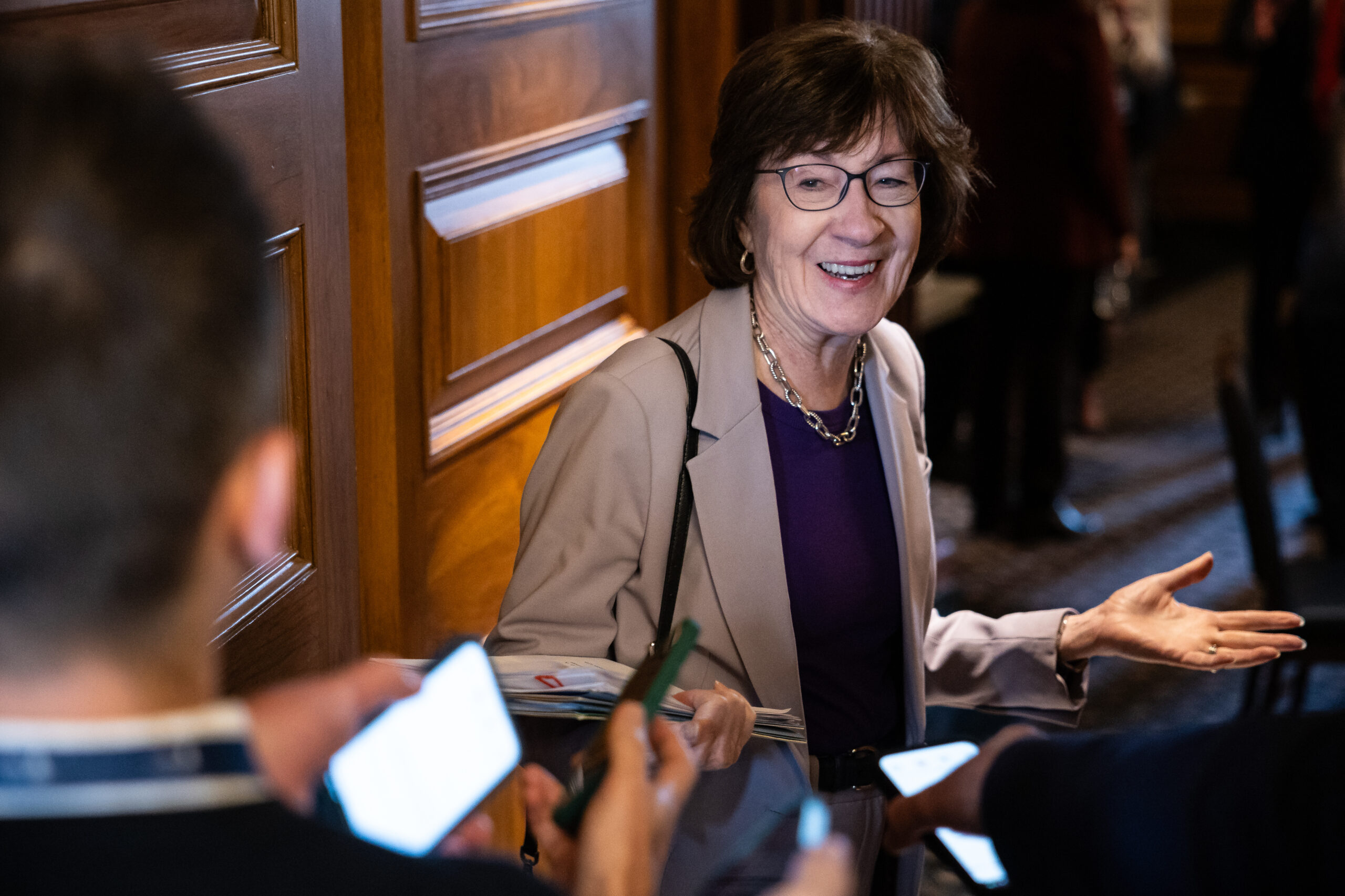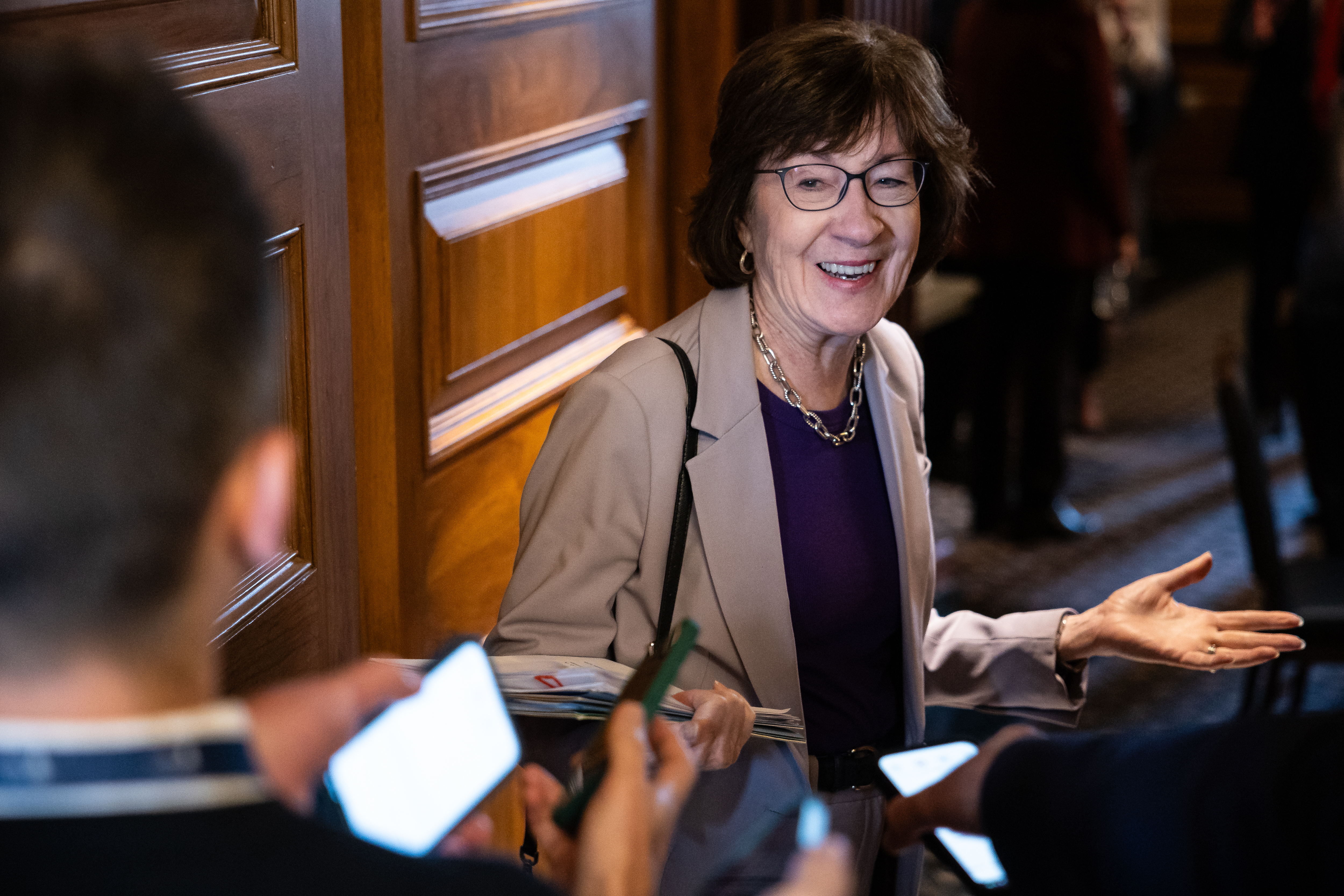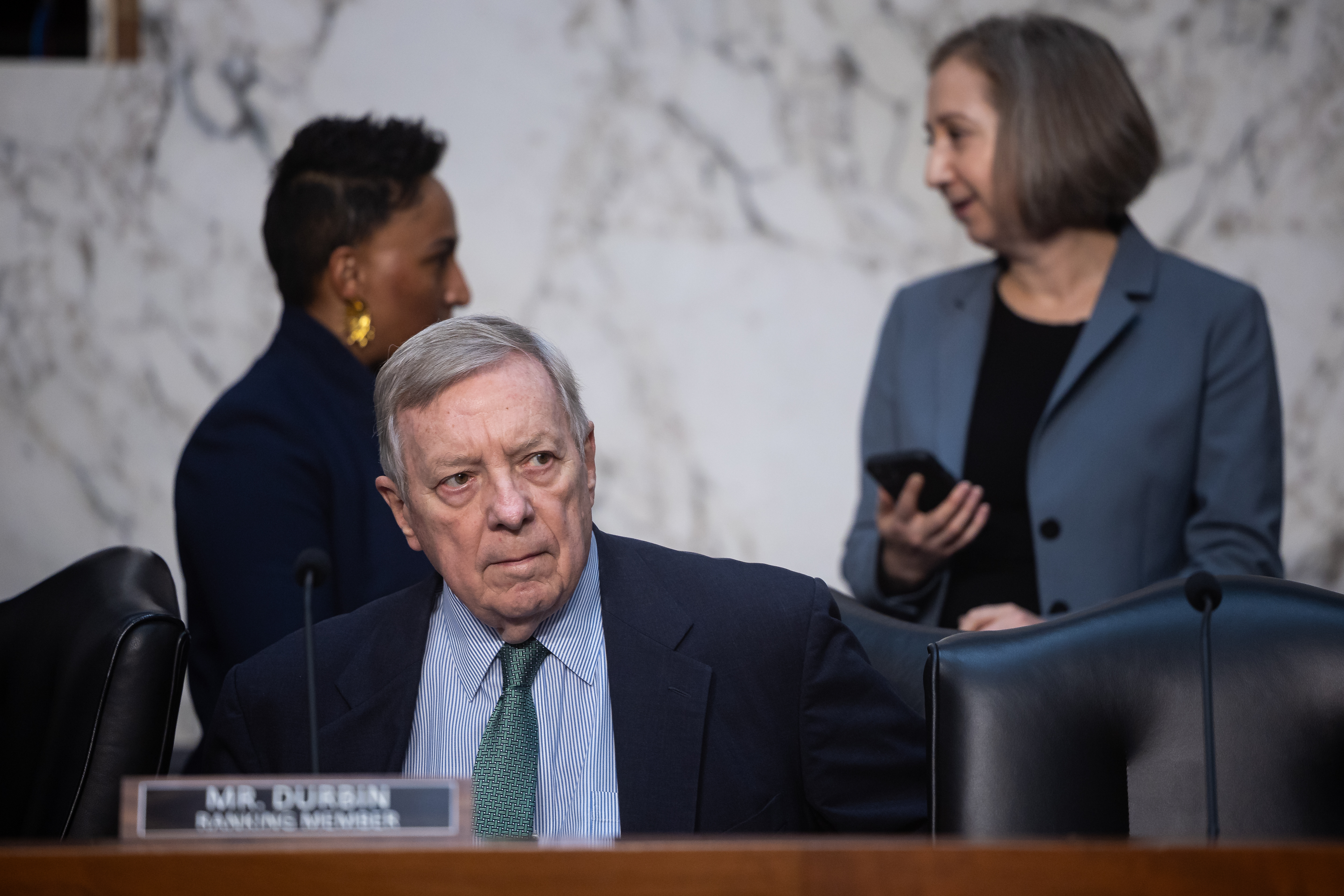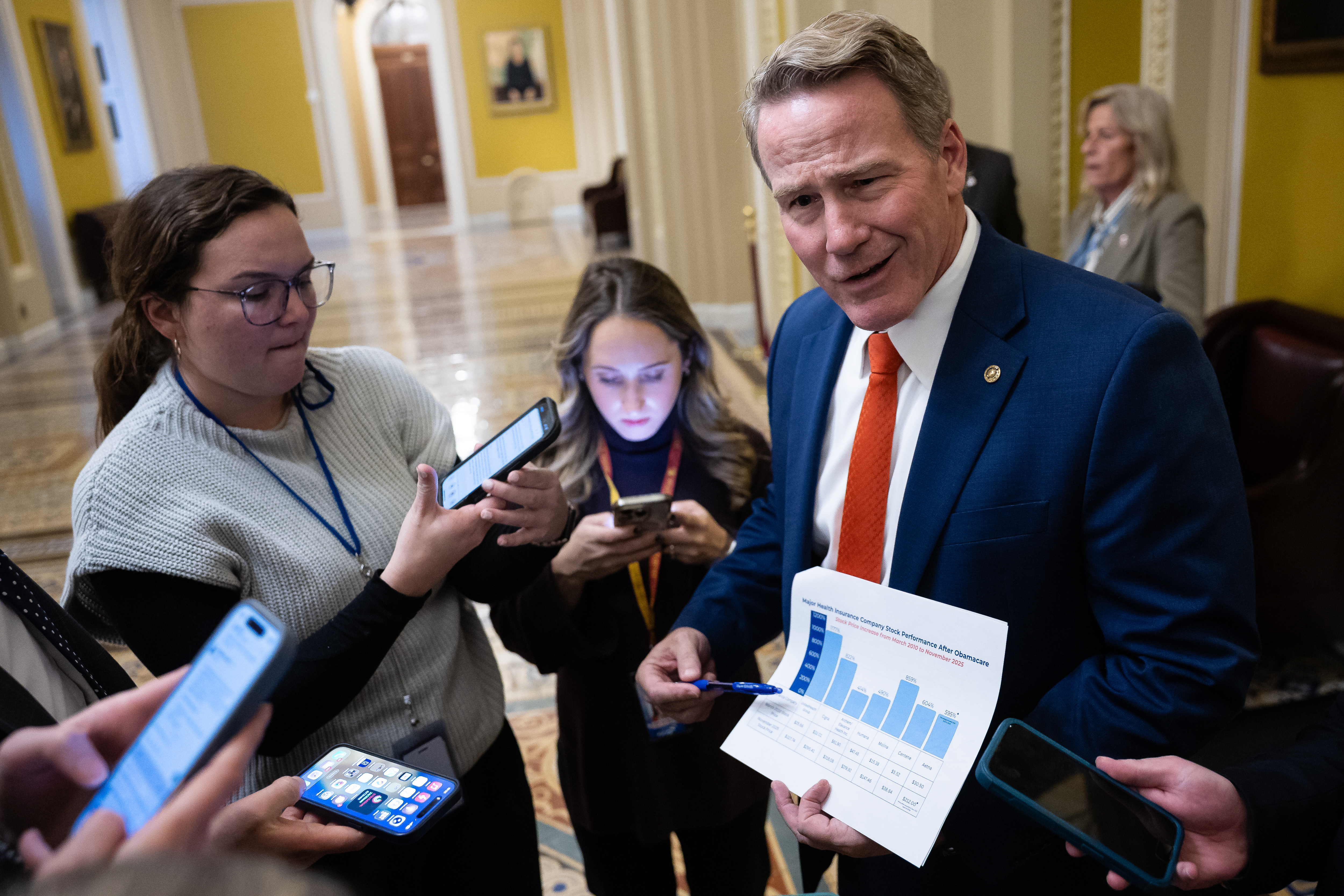Congress
Capitol agenda: Markup madness begins on Blue Light News
The House’s legislative sprint to pass President Donald Trump’s agenda by Memorial Day enters a new phase Monday, with Republicans gearing up for the first week of committee markups on the sweeping tax, border and energy bill.
It’s an ambitious timeline for Speaker Mike Johnson and there are doubts within the conference it’s even feasible. House Republicans did make progress on some items like tricky tax issues over the two-week recess, but they’re still far from agreement on key hangups, like the amount of spending cuts and any changes to safety-net programs.
A new clash is incoming between House Republicans and the White House, which is now cautioning against slashing the Supplemental Nutrition Assistance Program amid mounting concerns that slashing this benefit could hit the president’s voters. That goes against House conservatives, who want to overhaul a program they believe is filled with overpayment issues.
Some committees are privately trying to work out some of the thorniest issues before bringing their pieces of the megabill up for markups. Financial Services Republicans are meeting privately tonight to discuss their portion of the bill, according to a person granted anonymity to speak freely. Treasury Secretary Scott Bessent will also reconvene his “Big Six” meetings with Johnson, Senate Majority Leader John Thune and Congress’s tax chiefs on the GOP tax component of the package.
It’s all fair game for conversation when Johnson and Trump meet at the White House Monday. Meanwhile, here are the other big policy debates that will be on full display across as many as seven committee markups in the coming days:
— Transportation and Infrastructure is expected to meet and propose a $150 annual fee for all electric vehicles to help meet its $10 billion savings goal.
— Education and Workforce is expected to target Biden-era student loans while looking for $330 billion in spending cuts.
— Armed Services and Homeland Security won’t have the spending cut problem: They both have increases to their budgets as Republicans want to strengthen the military and beef up immigration enforcement at the border as part of their final package. But that could still spark some intraparty fights, with defense hawks and fiscal conservatives at odds over a proposed $150 billion increase for the Pentagon.
— Oversight and Government Reform is looking to force federal workers to pay more into their retirement accounts to help reach the committee’s $50 billion deficit reduction target.
— Financial Services is proposing slashing the Consumer Financial Protection Bureau’s funds by almost 60 percent as one way to reach its $1 billion savings goal.
— Judiciary could meet this week to determine how to allocate $110 billion, which could involve establishing new policies to crack down on legal immigration.
What else we’re watching:
– Thune could defy parliamentarian: Senate Majority Leader John Thune could flout the chamber’s parliamentarian, Elizabeth MacDonough, by allowing a floor vote on a resolution to undo certain Biden-era “waivers” allowing California to set stricter car emissions standards, which critics say amounts to an EV mandate. MacDonough recently ruled that this allowance doesn’t constitute a formal rule, so it would not be subject to reversal by lawmakers under a wonky procedural tactic known as the Congressional Review Act. But Sen. Kevin Cramer said in an interview he believes Thune is considering setting up floor consideration of a CRA resolution to undo the waivers, anyway.
– Rescissions decisions: Trump’s $9.3 billion rescissions request is expected to land on Capitol Hill this week. That will start a 45-day countdown (minus recess) for both chambers to pass a package codifying clawbacks of funding to the State Department, USAID, NPR and PBS. If Congress doesn’t clear legislation making these spending cuts in that timeframe, the president is then legally required to disburse the money.
– Revenge porn bill: The House will vote Monday on legislation that would crack down on non-consensual intimate photos and videos, including AI-generated deepfakes. The bill, spearheaded by Senate Commerce Committee chair Ted Cruz and backed by first lady Melania Trump, sailed through the House Energy and Commerce Committee in a 49-1 vote earlier this month.
Jordain Carney, Hailey Fuchs, Jasper Goodman, Benjamin Guggenheim, Meredith Lee Hill , Chris Marquette, Connor O’Brien, Oriana Pawlyk, Jennifer Scholtes and Mackenzie Wilkes contributed to this report.
Congress
The Trump loyalist at the center of the Senate’s Obamacare talks

If the Senate is going to strike a deal to revive a signature Democratic policy, it will be in part because of an unlikely broker: a freshman Republican from the party’s MAGA wing.
Sen. Bernie Moreno of Ohio is, on paper, an odd fit in the core group of about a dozen senators in talks to extend Obamacare credits that lapsed on Jan. 1. Most are well-known bipartisan dealmakers, such as Republican Susan Collins and Democrat Jeanne Shaheen.
Moreno, on the other hand, joined the Senate a year ago as a Trump-anointed presidential loyalist who had just defeated longtime Democratic Sen. Sherrod Brown with hard-line attacks focused mainly on immigration. But he has a key asset — a close relationship with Trump, who will need to bless or at least tacitly accept any agreement to smooth its passage through Congress.
Asked in an interview about his decision to take a leading role in the politically fraught health care negotiations, Moreno deployed one of Trump’s best-known slogans.
“Putting America first means putting Americans first,” he said. “People are being affected, and I want to help the people who need help. That’s what we should be doing.”
He said his goal is to get roughly 35 of the Senate’s 53 GOP senators to support an eventual deal — not just a handful joining Democrats on a “defection vote” — and that he’s keeping the White House and Senate leaders closely apprised of the discussions.
Senate Majority Leader John Thune praised Moreno in an interview as “whip-smart” and “willing to do the work.”
“He’s willing to sit down with people and try and find common ground, which I think on an issue like this is challenging,” he said. “Around here, that’s worth a lot.”

His involvement is also a sign that a new generation of bipartisan dealmakers might be starting to emerge after some of the Senate’s old hands headed for the exits in recent cycles. Moreno is now in close touch with not only Collins and Shaheen but other Senate pragmatists such as Tim Kaine (D-Va.), Lisa Murkowski (R-Alaska) and Angus King (I-Maine).
Moreno’s text chain with the dozen-member group is labeled the “EPTC OG gang” — a reference to the enhanced premium tax credits, the technical name for the Obamacare subsidies.
At times, Moreno’s new-kid-on-the-block status has been on display. After Moreno and Collins convened a meeting in December near the Capitol Rotunda, the Ohio Republican asked a reporter for directions to the room, inadvertently tipping off its location.
Minutes later, Collins walked toward the meeting seemingly astounded that word had gotten out about what she said was a “secret meeting.” Told about Moreno’s request for help, a bemused Collins put a hand to the side of her face.
Moreno said his freshman status means he doesn’t have “scars” from previous congressional fights.
“‘Oh, I don’t want to be working with this person,’ or ‘They screwed me back in 1972,’ you know?” he said. “I was in Kindergarten, so it doesn’t affect me.”

At 58, Moreno is on the younger side for the Senate, but he is already airing frustrations about the chamber’s growing polarization and making points about addressing it that jibe closely with complaints frequently heard from older generations of senators.
“I don’t think there’s enough muscle memory here about actually going in with good faith, good intentions and getting together and seeing if the deal can be cut,” he said.
The group of negotiators have their work cut out for them. They are discussing a two-year extension of the Obamacare tax credits that were beefed up under former President Joe Biden. Since their lapse at the end of last year, the tax credits — which were used by more than 500,000 Ohioans, according to KFF data — have reverted to their original 2010 levels, benefiting only those with incomes under 400 percent of the federal poverty level.
The Senate group’s proposed extension would include new restrictions including a $5 a month minimum premium payment and an income cap set at 700 percent of the federal poverty level. In the second year, the proposal would also give enrollees to take their subsidy as cash in pre-funded health savings accounts — an arrangement favored by Trump.
Moreno believes the group is in the “red zone,” and could be ready with text as soon as Tuesday or Wednesday. But some Democrats involved in the discussions have been more circumspect, wary about a thorny dispute over abortion.
Many Republicans say they will not be able to support a compromise unless the subsidies are tightened so they cannot fund abortions in any manner. Democrats say the safeguards built into the Affordable Care Act upon its passage in 2010 are sufficient.

“I think we’ve made clear from the start, the Democrats feel we have to come to the rescue and I hope we can do it,” said Sen. Dick Durbin of Illinois, the No. 2 party leader. But he warned that if the Republicans “decide they want to make this an abortion issue, I’m afraid that’s the end of the conversation.”
Moreno said the group wasn’t trying to relitigate questions over federal funding for abortions but acknowledged there is a “dispute” over whether that is currently happening.
Republicans’ heartburn over the issue flared last week after Trump suggested in remarks to House members that they should be “flexible” on abortion language — sparking outrage from outside conservative groups that ricocheted back on Congress.
A person granted anonymity to discuss the negotiations said Republicans in a larger negotiating group of roughly two dozen senators haven’t yet landed on a consensus position — much less the entire Senate GOP conference.
“There’s no need to come to a compromise because it’s already been dealt with in the Affordable Care Act,” Shaheen said when asked about the issue.

While the abortion question is a powerful force pulling some Republicans away from a deal, there are also compelling reasons for many to embrace a compromise — not least of which is the threat the expiring subsidies pose to the GOP majorities in November.
Among the vulnerable lawmakers is Moreno’s GOP partner in the Ohio delegation, Sen. Jon Husted, who is facing a likely matchup with Brown.
Moreno acknowledged that despite a feeling among negotiators that they are close to an agreement, it could all come to naught. Lawmakers “are on the clock,” he said, and getting a deal is an “if.”
“Capital I, capital F,” he said. “75-point font.”
Congress
Rep. Salazar touts Venezuela’s Machado before her visit
Rep. Maria Elvira Salazar on Sunday said Venezuela’s opposition leader Maria Corina Machado has “earned” enough to receive President Donald Trump’s backing as the South American country recovers from the capture of Nicolas Maduro.
“She proved to the international community that they, the opposition forces, had won the election,” the Florida Republican told CBS’ “Face the Nation.”
Salazar, who said she was in contact with Machado during the time she was in hiding during Maduro’s rule, added that Trump will be ”highly, highly pleased” with Machado when she visits Washington this week.
“I am sure that she will have a very good, long, solid conversation with the President,” Salazar said. “I think we are going to welcome her in Congress, and I’m sure that President Trump is going to be highly, highly pleased with that meeting.
Salazar’s optimism comes as the organization that oversees the Nobel Peace Prize announced Machado cannot give her recent award to Trump.
Machado won the prestigious prize in October, and quickly dedicated the award to the president. Trump had repeatedly expressed his desire to be awarded the prize, particularly in light of his work to end the Israel-Hamas war and other conflicts.
Trump declined to endorse Machado as the nation’s new leader in the wake of the raid that netted Maduro and left Venezuela at least temporarily leaderless. But Salazar on Sunday said Machado “is part of the transition” in Venezuela now that Maduro is no longer in power — a sharp difference from Trump’s previous statements that the U.S. will run Venezuela.
Salazar said there are things that the U.S. may not know about what is happening in Venezuela under Maduro’s allies, Delcy Rodríguez and Diosdado Cabello.
Still, her optimism continued as she said she is confident American prisoners will soon be released.
“We do not want to make any mistakes and I am sure that the political prisoners will be coming out and that we’re not giving them, meaning Diosdado and Delcy, any type of leeway for them to really run the country,” said Salazar. “We will see. I happened two, three weeks ago. Let’s give them a little bit more time before we see more results.”
Congress
Rand Paul: Bombing Iran ‘is not the answer’
Sen. Rand Paul expressed concerns Sunday over President Donald Trump’s threats to bomb Iran as the Middle Eastern country sees widespread protests continue.
Speaking with ABC’s “This Week,” the Kentucky Republican said he is not sure striking Iran “will have the effects intended.”
“We wish freedom and liberation the best around the world, but I don’t think it’s the job of the American government to be involved with every freedom movement around the world,” Paul said.
Paul also expressed concerns over how the administration would distinguish between Iranian protesters and law enforcement if Trump were to approve military action in the region.
“How do you drop a bomb in the middle of a crowd or a protest and protect the people there?” Paul said. “Plus there’s the constitution that we don’t let presidents bomb countries when they feel like it. They are supposed to ask the people through the Congress for permission.”
Protests erupted in the Islamic Republic late last month as Iranians expressed dissatisfaction over the country’s economic free fall. But as demonstrations have continued, many have begun to demand total regime change.
Reports indicate thousands have been arrested, and agencies have been unable to confirm the total death toll due to an internet blackout as the regime works to quell the dissent. The latest Associated Press report put the figure as at least 538.
Trump on Friday warned Iranian leaders, “You better not start shooting, because we’ll start shooting, too.” And an a post to Truth Social on Saturday, the president wrote that “Iran is looking at FREEDOM, perhaps like never before. The USA stands ready to help!!!”
But Paul on Sunday said that U.S. involvement may unintentionally rally protesters behind the Ayatollah.
“If you bomb the government, do you then rally people to their flag who are upset with the Ayatollah but then say, gosh, we can’t have a foreign government invading or bombing our country?” Paul said. “It tends to have people rally to the cause.”
He added that the protests are justifiable.
“The best way is to encourage them and say, we would recognize a government that is a freedom-loving government, that allows free elections, but bombing is not the answer,” Paul said.
-

 The Dictatorship11 months ago
The Dictatorship11 months agoLuigi Mangione acknowledges public support in first official statement since arrest
-

 The Dictatorship4 months ago
The Dictatorship4 months agoMike Johnson sums up the GOP’s arrogant position on military occupation with two words
-

 Politics11 months ago
Politics11 months agoFormer ‘Squad’ members launching ‘Bowman and Bush’ YouTube show
-

 Politics11 months ago
Politics11 months agoBlue Light News’s Editorial Director Ryan Hutchins speaks at Blue Light News’s 2025 Governors Summit
-

 Politics11 months ago
Politics11 months agoFormer Kentucky AG Daniel Cameron launches Senate bid
-

 The Dictatorship11 months ago
The Dictatorship11 months agoPete Hegseth’s tenure at the Pentagon goes from bad to worse
-
Uncategorized1 year ago
Bob Good to step down as Freedom Caucus chair this week
-

 Politics9 months ago
Politics9 months agoDemocrat challenging Joni Ernst: I want to ‘tear down’ party, ‘build it back up’










